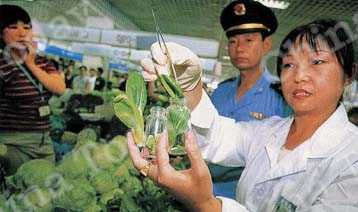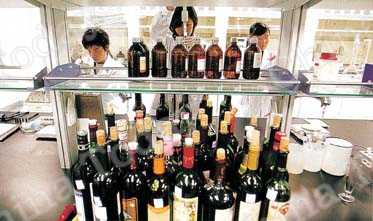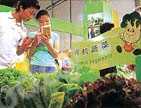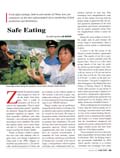Food safety mishaps, both in and outside of China, have put consumers on the alert and prompted closer monitoring of food production and distribution.

Food safety workers taking test samples at a food market in Beijing's Haidian District.
ZHANG Xin and her mother often disagree on where to do the family food shopping. "Just a couple of cucumbers cost five or six yuan in the supermarket. They're much cheaper at the produce market," grumbles the matriarch. Zhang Xin argues that supermarket vegetables are organic - free from pesticides, antibiotics and other chemicals - and cultivated and marketed according to strict standards. She insists that superior quality never comes cheap, and that it's worth spending the extra money to protect the family's health.
People of Zhang's mother's generation have had scant dealings with organic food, even though it appeared in China back in the 1990s. Organic comestibles are produced by 1,155 specifically certified enterprises in China, and are available on the Chinese market in 100 varieties, in the form of grain, vegetables and cooking oil. The area of land in China designated for growing organic crops is now 300,000 hectares.
Zhang's mother may be unwilling to change the thrifty habits of a lifetime, but nevertheless takes pains to prepare quality victuals for her family. She shops at the produce market, where farmers hawk wares that they either grow themselves or purchase from wholesalers. The pork she buys there bears the purple stamp of quarantine approval. China's licensed slaughterhouses deal only in hogs that have the requisite documentation. It comprises the local authority quarantine certificate confirming no breakouts of disease have occurred in the area of origin; a transportation vehicle hygiene certificate; and confirmation of the vaccination earmark on each hog. Pork emanating from slaughterhouses must pass 18 tests before receiving both the purple stamp of approval from the animal quarantine department of the local agricultural and forestry administration and the quality guarantee stamp from the slaughterhouse before it enters the market.
Zhang Xin never bothers to look for the purple stain on pork because she always shops in supermarkets, where a quality control system is automatically in place.
A notice in the fish section of the French-invested Carrefour supermarket reads: "The quality of our fish is guaranteed by its direct purchase from the aquatic farm." Next to it is a flow chart giving details of the time the goods are picked up and brought to the store: "The truck arrives at the aquatic farm at 4:00 am, leaves at 4:30 am and arrives at the store at 6:00 am. The store opens at 8:30 am." A notice in the pork section declares: "Our pork is supplied by a farm belonging to the Beijing Resource Group of Daxing District of Beijing, whose entire process of pig rearing to pork product processing is regularly supervised by independent organizations. The pork it produces has passed the test administered by the Beijing Office of Safety Production of Edible Produce."
These confirmations are reassuring at a time when the Chinese people are increasingly concerned about food safety, in view of the crooked dealings that frequently occur as regards product quality and weight. It is widely acknowledged that the standardized managerial and operational systems administered by the bigger retailers ensure that their foodstuffs are of the highest quality.
The government, however, takes ultimate responsibility for food safety. Back in December 2003, the Beijing municipal government established an office whose specific function is to oversee, coordinate and investigate food safety issues. Its other duties include amassing food safety information for release to the media, and analyzing, assessing and preventing food safety risks.

Beijing's food tracking system is one of many measures the city has taken to improve food safety in the local market. Photos by China Foto Press
In addition to stepping up controls on locally produced food, Beijing has also intensified scrutiny of that brought in from outside the capital.
In addition to stepping up controls on locally produced food, Beijing has also intensified scrutiny of that brought in from outside the capital. Vegetable wholesale centers are required to conduct tests on the bulk of incoming produce, and to reject and report to the relevant agricultural, industrial and commercial authorities any that fall short of the expected standard. Vegetables from a particular source that fail three successive spot-checks within six months are banned from the Beijing market for that amount of time.
Identity-Tagged Food
As food safety is crucial to the success of the 2008 Olympic Games, Beijing currently conducts stringent quality control over 45 varieties of foodstuffs in its markets.
On August 8, 2007 - one full year ahead of the event - Beijing announced the inauguration of a tracking system on three categories of comestibles - prepackaged food, vegetables/fruits and livestock/fowl products. Packages bear a special label giving customer access to information on relevant food sources via the Internet, touch screens in stores, and telephone.
The system in place regarding fruits, vegetables, beef and aquatic products, currently operating on a trial basis, is scheduled to extend full-scale over the whole nation. "The system will continue to serve Beijing residents after the 2008 Games. There will be records of every egg and fish distributed through regular channels," confirms Tang Yunhua, section chief of the Beijing Food Safety Office.
China's Recent Food Safety Measures
The quality of food on the Chinese market has risen steadily in recent years. Random sampling in 2006 showed that 77.9 percent - a rate that rose to 85.1 percent in the first half of 2007 - met required standards. Pollution-free, green and organic produces now account for 90 percent of China's agricultural product exports.
The Chinese government has established and firmly enforced a market access system applicable to sales of foodstuffs, whereby food producing and processing enterprises incorporate the technical and procedural conditions necessary to ensure product quality. The QS (quality safety) label on products from these enterprises signifies that they have undergone quality control procedures before leaving the factory. By the end of the first half of 2007, China had issued 107,000 food production licenses to food manufacturers that represent 90 percent of their respective sectors.
China has worked out a complete legal system for food safety, and is currently upgrading its system of standardization. So far more than 1,800 national standards, including 634 that are compulsory, as well as 2,900 food industry standards, have been formulated.
The food safety test system is also taking shape. As regards domestic foodstuffs, national testing organizations act as the helmsman, provincial and ministerial departments as the backbone, and city- and county-level setups as backup. Supervision of foodstuff imports and exports is handled by 163 quarantine laboratories, 35 of which are national key laboratories equipped with advanced testing and quarantine apparatus.

Organic vegetables are the latest food trend.


 Copy Reference
Copy Reference 